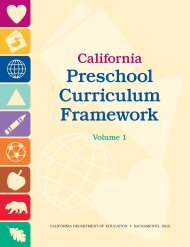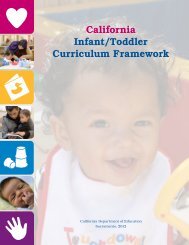California Preschool Learning Foundations - ECEZero2Three ...
California Preschool Learning Foundations - ECEZero2Three ...
California Preschool Learning Foundations - ECEZero2Three ...
Create successful ePaper yourself
Turn your PDF publications into a flip-book with our unique Google optimized e-Paper software.
competence, emotion regulation,<br />
conscience development, and psychological<br />
adjustment. Higher effortful<br />
control is, in short, a benefit for young<br />
children’s deliberate and socialized<br />
conduct.<br />
The research on executive function<br />
seeks to explain young children’s problem-solving<br />
behavior in regard to their<br />
ability to regulate their attentional and<br />
cognitive processes, another aspect<br />
of self-regulation (see Zelazo and others<br />
2003). This research identifies the<br />
period of three to five years of age as<br />
an especially important developmental<br />
period for executive function, which<br />
may be associated with concurrent<br />
changes in brain functioning (Bunge<br />
and Zelazo 2006; Diamond and Taylor<br />
1996; Gerstadt, Hong, and Diamond<br />
1994).<br />
Among the various capacities young<br />
children gradually acquire for selfcontrol,<br />
emotion regulation has been<br />
of particular interest to developmental<br />
scientists because of its relevance to<br />
social competence and psychological<br />
adjustment. Thompson, Meyer, and<br />
Jochem (in press) have written several<br />
reviews of theory and research on this<br />
topic, summarizing an expanding body<br />
of research literature.<br />
Social and Emotional<br />
Understanding<br />
Over the past several decades, there<br />
has been an enormous amount of<br />
research interest in the early development<br />
of social and emotional understanding.<br />
This interest has arisen from<br />
the realization that, contrary to traditional<br />
ideas, toddlers and preschoolers<br />
are not egocentric but are, instead,<br />
very interested in others’ beliefs and<br />
how those beliefs compare with their<br />
<strong>California</strong> Department of Education • <strong>Preschool</strong> <strong>Learning</strong> <strong>Foundations</strong>, Volume 1<br />
own (see Dunn 1988; Saarni 1999).<br />
Further exploration of this topic has<br />
also been motivated by the realization<br />
that early differences in social and<br />
emotional understanding are associated<br />
with individual differences in<br />
social competence. <strong>Preschool</strong>ers who<br />
are more socially and emotionally perceptive<br />
are capable of greater success<br />
in their relationships with peers and<br />
adults (see Denham and others 2003;<br />
Denham and others 2002a; Denham<br />
and others 2002b; Denham and others<br />
2001; and see reviews by Denham<br />
1998, 2006; Denham and Weissberg<br />
2004; Halberstadt, Denham, and<br />
Dunsmore 2001), which is relevant to<br />
school readiness. Young children who<br />
are more competent in understanding<br />
others’ feelings have been found, for<br />
example, to become more academically<br />
competent in the primary grades,<br />
which may arise from the more successful<br />
peer relationships to which<br />
they contribute (Izard 2002; Izard and<br />
others 2001; see also Dowsett and<br />
Huston 2005; Raver 2002; Raver and<br />
Knitzer 2002).<br />
<strong>Preschool</strong>ers who are more socially<br />
and emotionally perceptive are capable<br />
of greater success in their relationships<br />
with peers and adults . . .<br />
23<br />
In recent years, research in this area<br />
has grown under the idea that young<br />
children develop a progressively more<br />
complex “theory of mind,” by which<br />
they explain people’s behavior with<br />
respect to internal mental states. They<br />
gradually come to understand internal<br />
mental states more and more fully.<br />
Research on developing theory of mind<br />
has focused on the ages of three to five<br />
years, the period during which young<br />
SOCIAL-EMOTIONAL DEVELOPMENT
















